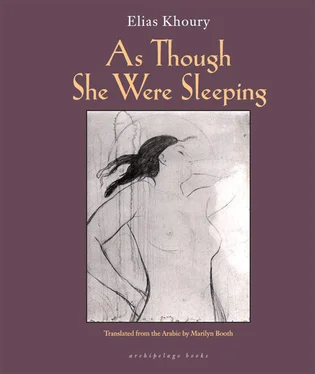It hadn’t been in anyone’s mind that Milia would be forced to abandon school, though, or that Musa would not enter the university but rather would go to work as an accounts clerk at the Seaside Inn on Lake Tiberias. But the shop was no longer enough to keep the family going. Milia did not have a choice. After the father’s death, Saadeh’s illness transformed the house into a living hell. Their mother’s right arm was completely paralyzed, the numbness spread across the entire side of her body, and she was in pain from her shoulders to her feet. She was completely disoriented and in a permanent daze, her wailing hemorrhaging the so-called weak letters of the alphabet, with her aaas and aawws and aayys , which Milia was convinced were the letters of pain. Somehow, the girl thought, the Arabic language had been constructed out of groans of pain, creating strength from the weakness that deformed those letters — for after all, these were letters that could connect words and had the power to intensify and condense meanings. That was what she had been taught by her teacher, Ustaz Kamil Samara, who guided her in the worlds of ancient poetry, and made her learn by heart the seven great odes. Their elderly white-haired teacher brought his lunch to the Zahrat el-Ihsan School every day, setting out his repast on his desk in the classroom at midday and letting his tongue go, roaming the universe of literature. His lessons were like a boat bobbing about in an ocean of language. In Milia the elderly teacher saw a writer of the future. She was the only pupil among these girls who memorized the ancient poems and could recite them in others’ hearing without stumbling over their words. She would stand up and recite the poem, swaying with the movements of the letters and enabling their ascent when the moment came. The vowels, said the teacher — those sounds that made the consonants move — were like oars in little boats. Three sounds: aa, wa, ya . Within them they held the pains of humankind, aaa and aaww and aayy . Weak or deficient they might be — said the ancient grammarians — but they formed the joints between sounds. They were the ligaments that bound words together. They made it possible for words to name things.
Ustaz Kamil Samara was her first story after the death of her father. When they said goodbye she told him she would take him with her, and she hugged to her chest the notebook she had filled with the ancient Arab odes of the desert. It was the end of the school year. The girls were saying goodbye to their teachers and their schoolmistresses, and they all had armfuls of notebooks, a sure sign that the year was truly over. Milia extracted her notebook of poems from the brown bag in which she had put all of her books and binders and exercise pads. She hugged it closely to her chest when she noticed her elderly teacher’s tears. He was saying goodbye to the girls he had taught, for now he was to be put out to pasture.
This is what they want, my children, he said. They want me to retire. He wrote the word mutaqa’id on the blackboard and then drew a slash between the t and the q , just where the a would appear if the Arabic script showed vowels. He read the word as if it were two separate words: mut qa’id . See? he said. mut: i have died . That’s what they want. qa’id. sitting . Can a man of letters retire? Can any writer suddenly go mut and qa’id ? But that’s what they’re insisting on! So, instead of my reading the weak deficient letters in the language, I’ll be living them with my body.
Tears rolled from his eyes and a murmur went up from the rows of seated students. Milia saw how tears burned their way down his cheeks as the deficient letters spread across his body and covered it in pain.
I’m going to take you with me, she said to him when she said goodbye. But she didn’t know that she would leave the school too: that her mother’s chronic maladies would sketch out a different life for her.
The mother’s medication was the nun and her painkiller consisted of visits to the Convent of the Archangel Mikhail, where mystery mingled with the truth. The nun reduced the world to one word: sirr , mystery. The world bounded by Haajja Milana’s awareness began with the mystery that brought her to the convent at the age of five. Her mother had died. Her father put her into the nuns’ care when he decided to travel to his relatives in the plains of the Houran in order to remarry. It’s just a few months and I will be back, said the man whose features Haajja Milana had forgotten. All she had left of him was a memory of his hoarse voice. Just a few months and I’ll come back and take the girl home. But he did not come back and his features dissolved into the vapors of the convent’s incense.
The vapor that incense makes is the closest substance to a human being because it looks like the spirit: clear air with a wash of viscous white. We are white like this, a thick creamy white that we veil in the blackness of our clothing to remain modest. We wear mourning garb over our sins. People are scented vapors and death returns us to the essence. God can tell sinners apart from the innocent just from the smell of them. It’s all incense, my girl, that’s all it is.
Milia came to fear people’s spirits. When she stared at people she saw not bodies but masses of vaporous incense. In her dreams she began to see spirits — were they souls? — like white smoke appearing and vanishing. She began to fear her mother and the nun and the cures with cotton and oil. The mother picked up her pains and waddled to the church, leaving Milia alone in the house teaching herself how to cook. Suddenly the cooking pot opened before her eyes like the sky opens before the saints. That was the way she felt when she discovered that cooking is nothing more than weighing and balancing relationships between garlic, onion, coriander, and lemon; and that the fragrance comes from the hand that creates the balance. She saw signs of delight on the faces of her brothers. This was the end of the plain, insipid cuisine that Saadeh had produced. Here came Milia’s food, laced with innumerable and complicated fragrances. The domestic atmosphere of the Shahin household was transformed. The dinner table, their only daily gathering, became a joyous fête. The poverty in which the family lived had not changed but the fragrance of life entered it with the ministrations of this girl around whose eyes the flavors of words hovered and soared.
When life forced her to leave school, Milia crossed the threshold into the worlds promised by her grandmother’s books. According to Saadeh, the grandmother (whose senility she had long had to endure) woke up from her nap one day, summoned her daughter-in-law and pointed to her wooden chest. It’s for Milia, she said. All my life I’ve lived with this chest, my girl — without it, I couldn’t have stood to live. This is for Milia. Give it to her but wait until she’s a bit older. Tell her, this is from your grandmama Umm Yusuf.
What a woman she was! This was what Milia wanted to tell Mansour about her grandmother, when he started talking about his mother and brother. They lived in the city of Jaffa and they had been demanding that he, Mansour, return there to work in the modest foundry and hardware business that their father had left them. He did not want to go back, Mansour told his wife, because he was no longer willing to put up with his mother’s ways. She had always tried to control her sons’ lives, ordering them around at work and at home. In Nazareth he had acquired an independent life. Moreover, in this silent woman across whose eyes moved clouds of sleepiness, this man on the verge of turning forty had found his emotional and bodily repose. She was a woman very much like the little town he had chosen as the seat of his trade and the home for the family he would establish.
Читать дальше












